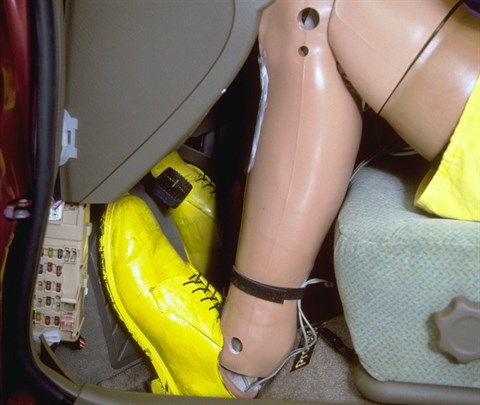Moderate overlap front: original test
Rating applies to 1999-2003 models
Tested vehicle: 1999 Mazda Protegé LX 4-door
The Mazda Protege was redesigned for the 1999 model year.
| Overall evaluation | |
|---|---|
| Structure and safety cage | |
| Driver injury measures | |
| Head/neck | |
| Chest | |
| Leg/foot, left | |
| Leg/foot, right | |
| Driver restraints and dummy kinematics Dummy movement was reasonably well controlled. During rebound, the dummy moved toward the driver door. Its head went part of the way out the open window and approached but didn't hit the window frame. |

Action shot taken during the frontal offset crash test.

The driver's survival space was maintained reasonably well, although there was more intrusion into the footwell area than is desirable.

Intrusion into the footwell area contributed to the likelihood of leg injuries.

The rear bumper system on the 1999 model allowed excessive damage in a 5 mph pole impact -- more than $2,800 worth of damage compared with about $700 damage to the predecessor Protege model.
Measures of occupant compartment intrusion on driver side
| Test ID | CF99005 |
|---|---|
| Footwell intrusion | |
| Footrest (cm) | 24 |
| Left (cm) | 29 |
| Center (cm) | 27 |
| Right (cm) | 21 |
| Brake pedal (cm) | 21 |
| Instrument panel rearward movement | |
| Left (cm) | 6 |
| Right (cm) | 4 |
| Steering column movement | |
| Upward (cm) | 4 |
| Rearward (cm) | 3 |
| A-pillar rearward movement (cm) | 5 |
Driver injury measures
| Test ID | CF99005 |
|---|---|
| Head | |
| HIC-15 | 230 |
| Peak gs at hard contact | no contact |
| Neck | |
| Tension (kN) | 2.2 |
| Extension bending moment (Nm) | 33 |
| Maximum Nij | 0.52 |
| Chest maximum compression (mm) | 28 |
| Legs | |
| Femur force - left (kN) | 4.8 |
| Femur force - right (kN) | 3.3 |
| Knee displacement - left (mm) | 1 |
| Knee displacement - right (mm) | 1 |
| Maximum tibia index - left | 1.01 |
| Maximum tibia index - right | 1.54 |
| Tibia axial force - left (kN) | 1.1 |
| Tibia axial force - right (kN) | 3.7 |
| Foot acceleration (g) | |
| Left | 87 |
| Right | 95 |
